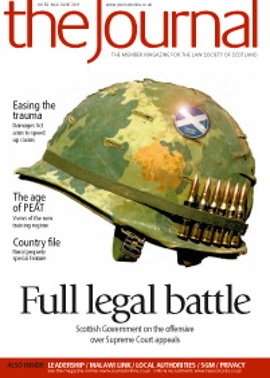Rural property - Farm tenancies: more changes imminent

The Agricultural Holdings (Amendment) (Scotland) Bill was published in the dying days of the last Parliament. It attempts to deal with some of the issues it was not possible to deal with in the Public Services Reform (Agricultural Holdings) (Scotland) Order 2011.
The idea is for a simple Act to be introduced dealing with a narrow range of issues:
Succession by near relatives
The current definition defines a near relative as “a surviving spouse or child of a deceased tenant including adopted child”. It is felt that this is too restrictive and should be expanded to include grandchildren, which seems sensible, especially from the tenant’s point of view. However, for landlords that could have quite significant implications, especially if the class of near relatives as defined in the 1991 Act were not suitable or had predeceased the tenant. A landlord under the current definition might well have been able to get the farm back when the existing tenant died if, for example, his son had predeceased him leaving a grandchild. Under the new legislation the grandchild could succeed to the tenancy.
Rent reviews for LDTs
Under s 9 of the Agricultural Holdings (Scotland) Act 2003, parties to limited duration tenancies are currently free to agree terms of rent reviews. If the lease doesn’t mention rent reviews, provisions in s 9 apply, a three-yearly rent review cycle as per the 1991 Act. Some LDTs have been drafted with upwards-only rent reviews and/or only permit rent reviews that are instigated by the landlord. The intention of the proposed changes to s 9 is to make void such any provision in new LDTs. This obviously has a potentially significant impact for some landlords who are keen to have, at least as far as rent reviews are concerned, some freedom of contract.
I am not sure how much of a problem this will be in practice, because although I have come across upwards-only and landlord-only initiated rent reviews, it is certainly not universally adopted. The proposed changes do illustrate the thinking behind much of the agricultural holdings legislation, namely that tenants are perceived to need greater protection under the law than landlords.
I doubt if any tenant has agreed to an upwards-only rent review without understanding the implications and it depends whether you think they need additional protection, particularly since the minimum LDT period is being reduced from 15 to 10 years.
VAT and rent reviews
The English case of Mason v Boscawen [2008] EWHC 3100 (Ch) raised the question of whether a change in the VAT rate might be deemed to be a variation of rent which would interfere with the rent review cycle under the Agricultural Holdings Act 1986, which has similar provisions relating to rent reviews as the 1991 Act. The potential problem in England was resolved in s 79 of the Finance Act 2009, which in effect stated that changes to the VAT rate would not be deemed to be a rent review.
The proposed changes in the Act are intended to remove ambiguity and state that VAT changes will be disregarded so far as the three-year rent review cycle is concerned. This would seem to be a sensible and non-contentious amendment.
Fragmented law
The bill is short, if not necessarily sweet. Whether the additional changes will survive the consultation and parliamentary processes remains to be seen. There is quite a bit of pressure from interested parties to widen the scope of the bill to deal with other issues.
However the agricultural holdings legislation is becoming fragmented again. We have the 1991 Act, the 2003 Act, the Public Services Reform (Agricultural Holdings) (Scotland) Order 2011 and now the Agricultural Holdings (Amendment) (Scotland) Bill. There are other changes that interested bodies wish to make to the legislation, for example in relation to perhaps a wider review of succession to tenancies, so there will undoubtedly be pressure for additional changes in the future.
While piecemeal changes deal with issues of major concern relatively quickly, the downside is that the legislation becomes fragmented and ever more complicated. It won’t be long before another consolidating Act will be required, and even when that is made, how long will it last as it in turn is tinkered with?
- The consultation can be viewed at www.scotland.gov.uk/publications/2011/ 03/18095404/0. It closes 30 June.
In this issue
- Breaking new ground
- A&A accounts and abatements
- What price privacy?
- Power struggle
- Rural peace?
- Damages for our times
- Grief revalued
- Up to speed?
- Into Africa
- Expenses review opens with invitation on issues
- Law reform update
- From the Brussels office
- Dundee students join advice network
- The learning curve
- Ask Ash
- Guiding hands
- Marriage made in heaven?
- Email on the spot
- One for the accused to prove
- Going for growth
- A brake on termination?
- The colour yellow
- All change on the croft
- Natural justice in play
- Website review
- Book reviews
- A time of opportunity
- Rural property - Who wants to be a green wellie conveyancer?
- Rural property - Buying and selling: pitfalls and problems
- Rural property - In the taxman's sights
- Rural property - Farm tenancies: more changes imminent
- Now we are 10






